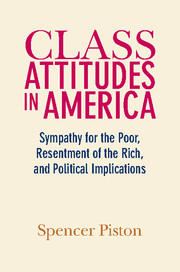Crossref Citations
This Book has been
cited by the following publications. This list is generated based on data provided by Crossref.
McFarland, Laurel
2019.
Preparation for government service in the United States.
Revue française d'administration publique,
Vol. N° 170,
Issue. 2,
p.
365.
Smit, David
2019.
Power and Class in Political Fiction.
p.
173.
Kalmoe, Nathan P
2019.
Speaking of Parties… Dueling Views in a Canonical Measure of Sophistication.
Public Opinion Quarterly,
Vol. 83,
Issue. 1,
p.
68.
Kalmoe, Nathan P.
2020.
Uses and Abuses of Ideology in Political Psychology.
Political Psychology,
Vol. 41,
Issue. 4,
p.
771.
Macdonald, David
2020.
Trust in Government and the American Public’s Responsiveness to Rising Inequality.
Political Research Quarterly,
Vol. 73,
Issue. 4,
p.
790.
Sica, Carlo E.
2020.
For a Radical Green New Deal: Energy, the Means of Production, and the Capitalist State.
Capitalism Nature Socialism,
Vol. 31,
Issue. 4,
p.
34.
Macdonald, David
2020.
Class Attitudes, Political Knowledge, and Support for Redistribution in an Era of Inequality.
Social Science Quarterly,
Vol. 101,
Issue. 2,
p.
960.
Lindh, Arvid
and
McCall, Leslie
2020.
Class Position and Political Opinion in Rich Democracies.
Annual Review of Sociology,
Vol. 46,
Issue. 1,
p.
419.
Wilson, Graham K.
2020.
Authoritarian Populism and Liberal Democracy.
p.
123.
Ellis, Christopher
and
Faricy, Christopher
2020.
Race, “Deservingness,” and Social Spending Attitudes: The Role of Policy Delivery Mechanism.
Political Behavior,
Vol. 42,
Issue. 3,
p.
819.
Trump, Kris-Stella
2021.
Who Gets What?.
p.
79.
Fusaro, Vincent A.
2021.
State Variation in TANF Expenditures: Implications for Social Work and Social Policy.
Social Work,
Vol. 66,
Issue. 2,
p.
157.
CLIFFORD, SCOTT
SHEAGLEY, GEOFFREY
and
PISTON, SPENCER
2021.
Increasing Precision without Altering Treatment Effects: Repeated Measures Designs in Survey Experiments.
American Political Science Review,
Vol. 115,
Issue. 3,
p.
1048.
Harris, Fredrick C.
and
Rivera-Burgos, Viviana
2021.
The Continuing Dilemma of Race and Class in the Study of American Political Behavior.
Annual Review of Political Science,
Vol. 24,
Issue. 1,
p.
175.
Lindner, Andrew M.
and
Houle, Jason N.
2021.
Are All Politics National? County-Level Social Contexts and Inequality Remediation Attitudes, 2006 to 2012.
Socius: Sociological Research for a Dynamic World,
Vol. 7,
Issue. ,
p.
237802312110099.
Macdonald, David
2021.
Immigration Attitudes and White Americans’ Responsiveness to Rising Income Inequality.
American Politics Research,
Vol. 49,
Issue. 2,
p.
132.
Han, Sung Min
and
Han, Kangwook
2021.
Political Leaders, Economic Hardship, and Redistribution in Democracies: Impact of Political Leaders on Welfare Policy.
Political Studies,
Vol. 69,
Issue. 4,
p.
921.
Newman, Benjamin J.
and
Teten, Paul
2021.
Inequality Federalism and Economic Self-Interest in Subnational Progressive Tax Politics.
Political Research Quarterly,
Vol. 74,
Issue. 1,
p.
243.
Robison, Joshua
Stubager, Rune
Thau, Mads
and
Tilley, James
2021.
Does Class-Based Campaigning Work? How Working Class Appeals Attract and Polarize Voters.
Comparative Political Studies,
Vol. 54,
Issue. 5,
p.
723.
Macdonald, David
2022.
The Authoritarian Predisposition and American Public Support for Social Security.
Political Research Quarterly,
Vol. 75,
Issue. 3,
p.
918.





